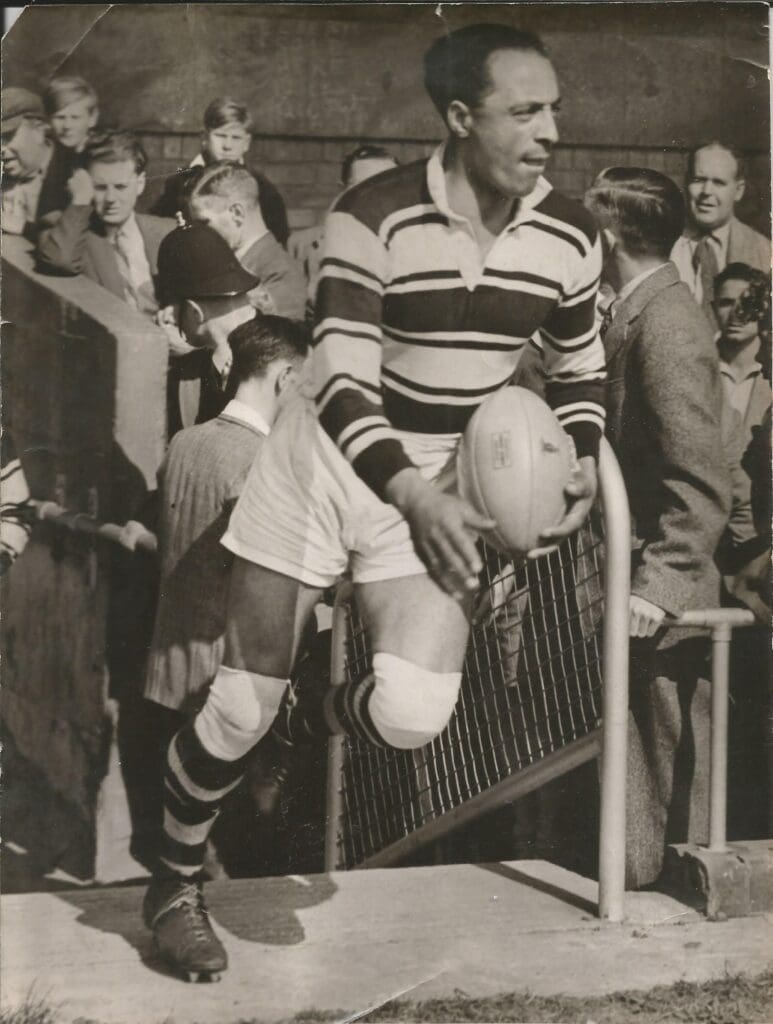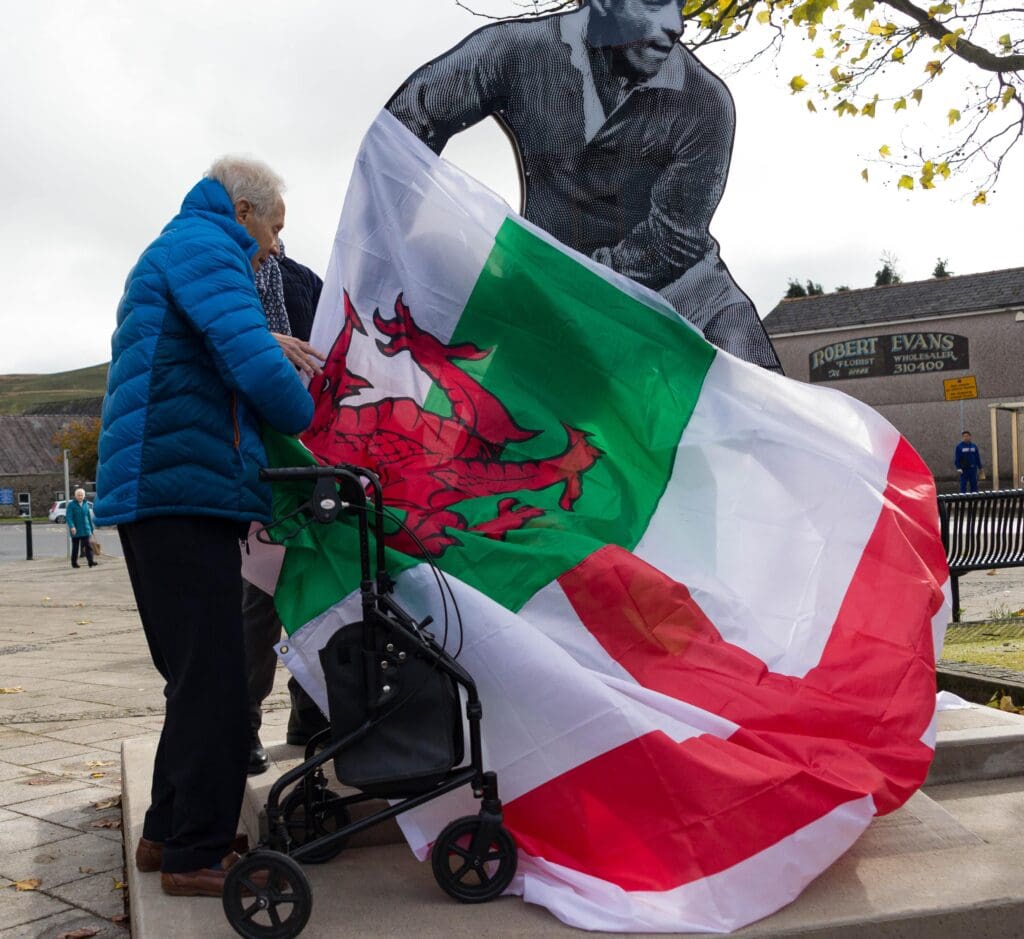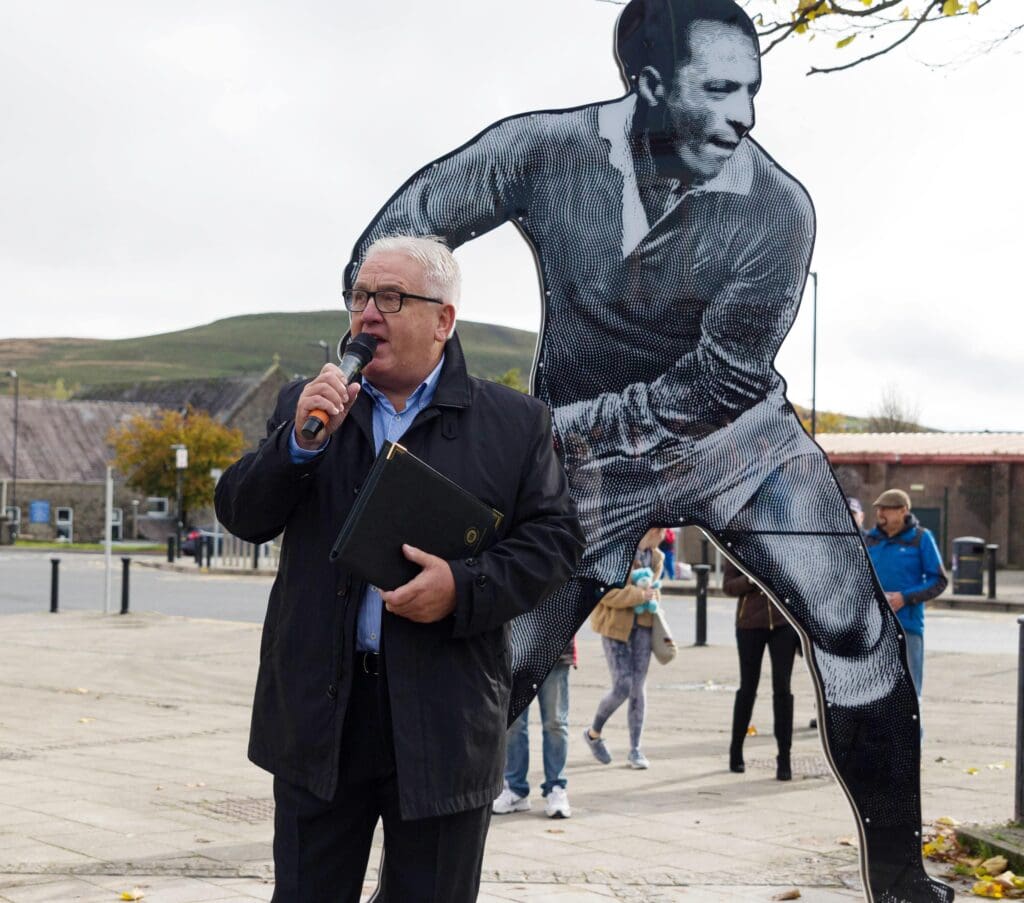The town of Brynmawr, Blaenau Gwent welcomed Roy’s family, rugby internationals past and present and visitors from across the UK when they unveiled a statue of rugby hero Roy Francis on Saturday 21 October 2023.
Roy was born in a nursing home across the river from the Principality Stadium, Cardiff on 20 January 1919. His mother was white and decided she could not keep him so he was raised by his father Albert Francis and his wife Rebecca and grew up in Brynmawr. Roy was a talented sportsman across a variety of sports including athletics, swimming, boxing, said to be his first love and rugby. After 4 games for Brynmawr and at the age of 17 he was spotted by a rugby league scout and became an early adopter of the move north to professional rugby at Wigan. This was quite a risk because in those days there was no return to union once you had signed for league.
Roy made a great start at Wigan scoring 9 tries in 12 matches but the arrival of an Australian coach halted his progress and to the dismay of many fans he was transferred to Barrow. His long and happy stay at Barrow was severely disrupted by World War II however he still managed a massive 72 tries in 113 games.
At Barrow, Roy had his Welsh call up and between 1946-48 he received 5 caps and scored one try. Roy also played one match for Great Britan becoming the first selected black player in any British International Sporting Team. He debuted in the deciding test in a 3 match series between GB and New Zealand played on the 20th December at Odsal Bowl Bradford. With 42,685 fans attending on the Saturday before Christmas, Roy the only Welshman in the team scored 2 tries in the first half seeing GB win 25-7 and gaining a £10 win bonus for himself. He was expected to be part of the history-making Great British Lions ‘Indomitables’ team – the only side to take the Ashes from Australia in Australia but Roy was overlooked because of the colour bar which operated down under at the time.
During wartime he guested for Dewsbury Rams where Eddie Waring was coach scoring 57 tries in 57 games and also turned out for the Army’s Northern Command and England Services at rugby union. After Barrow he moved to Warrington for a season scoring 27 tries in 37 games. However it was at Hull FC that he made most impact as a player and coach. Between 1948-55 he played 127 games scoring 60 tries. In his final season as player coach at Hull where he became the first professional Black coach of any sport in the UK.

Roy Francis was possibly the most important Sporting Coach in British History. He was the first to actively video & record training sessions and games, took care of and looked after the welfare of players in the form of health and diet, and arranged travel to games for wives and families. He personally built a running track next to Hull FC’s Stadium to improve the speed of players. Under Roy, Hull won the Championship in 1956 and 1958. The team also made it to The Challenge Cup Final at Wembley in 1959 and 1960 but were runners-up on both occasions.
Roy moved to Leeds in 1963 and during the following 5 years won the Championship League Leaders Trophy in 66-67 and 67-68, Yorkshire League 66-67 and 67-68, Yorkshire cup 68-69 and best of all in 67-68 they won the Challenge Cup beating Wakefield Trinity 11-10 at Wembley in the famous watersplash final on an unplayable pitch.
As well as 2 stints at Hull and Leeds, Roy coached at Bradford Northern and North Sydney Bears in Australia. It took Roy and his family a 6 week voyage to reach Australia, there was a brief stop in Capetown, South Africa but they weren’t allowed ashore due to apartheid that operated in the country at this time. Roy’s coaching raised the Bears from the bottom to mid table but the family weren’t happy and were experiencing racist remarks. The final straw came when Roy appeared in a weekly rugby league TV chat show, another guest made an under-the-table comment about racism. Roy stood up and left the Studio and then left Australia returning to coach at Hull FC, Leeds and finally at Bradford Northern.
Throughout his life, Roy faced political barriers and racism but rose to become one of the most successful sportsmen and coaches that Wales has ever produced. A small team of rugby league fans, historians and Blaenau Gwent councillors and officers have worked together to deliver a wonderful and fitting tribute to Roy that was unveiled at on Saturday 21st October during Black History Month.

The team would like to thank People’s Postcode Lottery, Postcode Community Trust, Hull FC, Leed’s Rhinos, Brynmawr RFC, The Talisman, Brynmawr Historical Society, Blaenau Gwent County Borough Council, Brynmawr Town Council, UK Government Wales Levelling Up Fund and One Call Wales, without who this tribute would not be possible.
A photographic exhibition of Roy Francis will be on display at Brynmawr Museum from 21st October – 4th November 2023. The museum is open Thursday 8.30 a.m. to 12.00 noon and 2.00 p.m. to 4.00 p.m., Friday 10.00 a.m. to 12.00 noon and 2.00 p.m. to 4.00 p.m. and Saturday 10.00 a.m. to 12.00 noon. Following this the exhibition is available for loan to schools and interested organisations and a digital copy will shortly be available for schools.
Alan Golding, producer of ‘The Codebrakers’ documentary said, When making the documentary, two players stood out from the rest, Roy Francis and Clive Sullivan. It made me and my business partner, Tariq Ali ask, Why did so many people of black heritage go north?’
Ian Golden of Wales Rugby League said, ‘Roy was special as he was an innovative coach and is revered in rugby league just as Carwyn James is in rugby union. His coaching methods were ahead of his time and he was one of the first to support the whole family, on and off the pitch, especially at times when they needed it most. He did all this as a man of mixed heritage facing the animosity he widely experienced.’
Professor Tony Collins, ‘Roy was a true pioneer of rugby. He was the father of modern rugby coaching but more importantly one of the greatest and outstanding but forgotten figures of black British and Welsh history.’
Lisa Jones, Roy’s cousin said, ‘it is an honour and a privilege to be here today. My Mm was so proud of him and made sure everyone knew of his achievements.’
Dr Victoria Dawson said, ‘Together Roy and his wife Rene, were instrumental in fostering a family culture in rugby league clubs. Between them their pastoral care was second to none and influenced how future husband and wife teams would operate within sport.’
Suzie Frith, Roy’s Grandaughter said, ‘I remember him primarily as my Grandfather, rather than a rugby hero. I am totally overwhelmed by everything I have seen and heard today.’
Anne Frances, Roy’s Daughter-in-law said, ‘We always spent a lot of time at the family home. He was a very private man and had a wonderful sense of humour. Roy and Renee had a strong bond and were always together. They met at the boarding house run by Renee’s parents and Roy lodged there. They were a real team, she even had her say on picking the team but the directors weren’t aware of that. I wasn’t sure how many were going to turn up and we are pleasantly surprized by the large numbers here today.
Glen Webbe, Wales ugby Union Wing said, ‘ Brynmawr ought to be proud of Roy and his success in the face of adversity. This is well deserved recognition. Everything is so different now to in his day, there was so much division then, black/white, rugby union/rugby league, and he would have faced a double whammy if he had not been a success.
Alun Davies MS, ‘This is a great occasion and a great statue bringing history to life. Congratulations to all involved.’
Jonathan Davies OBE has long been a campaigner to Get Roy Francis’s achievements recognised said, ‘it is fantastic that Roy Francis is being recognised here today. He was a true trail blazer in rugby coaching and was the first of black heritage to coach in any professional sport. He was a special person and undoubtedly his army background must have helped in the man management and discipline of his teams.’
Mike Nicholas, President of the Welsh Rugby League said at the unveiling, ‘ It is long overdue, this is recognition that Roy richly deserved and it is wonderful to be here in Brynmawr on the auspicious day.’

